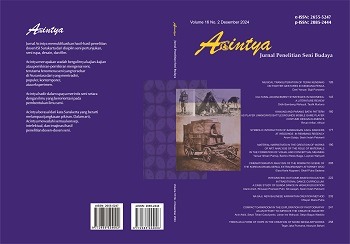INTEGRATING OUTCOME-BASED EDUCATION IN TRADITIONAL DANCE CURRICULUM: A CASE STUDY OF SUNDA DANCE IN HIGHER EDUCATION
DOI:
https://doi.org/10.33153/acy.v16i2.6758Keywords:
Outcome-Based Education, Sundanese Dance, Curriculum, Higher Education, Traditional ArtsAbstract
This research aims to integrate the Outcome-Based Education (OBE) approach in the curriculum in higher education, especially Sundanese dance courses. This approach is designed to increase the relevance of learning outcomes to the needs of society and the world of work. This study uses a descriptive qualitative method with a case study approach in the Dance Education Study Program, Faculty of Languages and Arts, Semarang State University. The research results show that the application of OBE in Sundanese dance learning can strengthen student competence, both in terms of technical skills and ability to adapt to global challenges.
Downloads
References
Abdurrahman, A., Nurdiana, R., & Ibrahim, M. (2023). Interdisciplinary Collaboration in Higher Education: Impacts on Student Competence. International. Journal of Educational Research.
Abrar, A. I. P. (2022). Model Pembelajaran E-Split Classroom untuk Melatih Keterampilan Berpikir Tingkat Tinggi dan Kemandirian Belajar. books.google.com.
Anitha, H. M. (2023). Attainment of Program Outcomes in Outcome-Based Education: A Case Study with Operating Systems Course. In Lecture Notes in Networks and Systems (Vol. 615, pp. 1–12). https://doi.org/10.1007/978-981-19-9304-6_1
Beine, M., Noël, R., & Ragot, L. (2021). Determinants of the International Mobility of Students. Economics of Education Review, 82, 102–118.
Biggs, J., & T. (2011). Teaching for Quality Learning at University. Open University Press.
Chen, Z., Chan, I. C. C., & Egger, R. (2023). Gastronomic image in the foodstagrammer’s eyes–A machine learning approach. Tourism Management.
Felder, R. M., & Brent, R. (2020). Active Learning: An Introduction. ASCE Journal of Professional Issues in Engineering Education and Practice, 146(1), 1–12.
Hofstede, G. (2001). Culture’s Consequences: Comparing Values, Behaviors, Institutions, and Organizations Across Nations. Thousand Oaks, CA: Sage Publications.
Juliarta, I. P. B. (2023). PENERAPAN TEKNIK SKETSA DENGAN KERTAS KARBON, MENINGKATKAN HASIL BELAJAR SENI LUKIS REALIS , SISWA KELAS XI SMK NEGERI 1 SUKAWATI TAHUN PELAJARAN 2021/2022. Acintya Jurnal Penelitian Seni Budaya, 14(2), 152–162. https://doi.org/10.33153/acy.v14i2.4001
Kearney, K., Zhang, L., & Asher, M. (2023). Community Engagement in Cultural Education: Strategies for Collaborating with Local Experts. International Journal of Educational Development.
Kivunja, C. (2018). Teaching and Learning in Higher Education: The Role of Technology in Shaping Future Practices. Journal of Curriculum and Teaching, 7(2), 15–28.
Kuncoro, J. S., Supendi, E., & Supendi, E. (2020). Penciptaan Tari Anak-anak Disabilitas Kami Tak Berbeda. Acintya Jurnal Penelitian Seni Budaya, 12(1), 59–67. https://doi.org/10.33153/acy.v12i1.3148
Mardiana, R., Hasan, N., & Nurlaela, A. (2023). The Impact of Project-Based Learning on Student Creativity and Competence. Journal of Higher Education Policy and Management, 123–139.
Muallifin, M. F. (2019). ISLAM DAN BUDAYA LOKAL (PLURALISME AGAMA DAN BUDAYA DI INDONESIA). Abdau: Jurnal Pendidikan Madrasah Ibtidaiyah. https://doi.org/10.36768/abdau.v2i1.25
Ragupathy, U. S. (2023). Understanding Knowledge Domain in Outcome Based Education Through Cooperative Learning Method. Journal of Engineering Education Transformations, 36(4), 7–12. https://doi.org/10.16920/jeet/2023/v36i4/23110
Rahman, A. (2022). Inovasi Kurikulum Berbasis Kompetensi. Jurnal Pendidikan Tinggi Indonesia, 5(3), 89–100.
Siti Aisyah, N., Harmanto, S., &, & G., B. (2023). Enhancing Soft and Hard Skills in Higher Education: The Role of Industry Collaboration. International Journal of Educational Management, 37(1), 45–60.
Suharti, N., & Nurhayati, H. (2022). Innovative Learning Models for Cultural Heritage Education: A Case Study in Indonesia. Journal of Cultural Heritage Management and Sustainable Development.
Sujana, I. K. (2021). Tari Tradisional di Era Globalisasi. Journal of Cultural Studies, 14(1), 45–58.
UNESCO. (2013). Skills for a Sustainable World. Paris: UNESCO Publishing.
Vukic, D., Candrlic, S., & Jakupovic, A. (2023). Monolayer Network Representation and Analysis of the Curriculum. Science and Information Conference. https://doi.org/10.1007/978-3-031-37963-5_59
Yanto, A., & Indriani, E. (2023). Globalization and Cultural Identity: Challenges for Education in the 21st Century. Asian Social Science.
Yen, P. H. (2023). Assessment Strategies in Outcome-Based Education: Preferences and Practices Among University Lecturers in Vietnam. International Journal of Learning, Teaching and Educational Research, 22(10), 416–432. https://doi.org/10.26803/ijlter.22.10.23
Yusni, D., Mahtuhah, M., Supriatno, B., & Riandi, R. (2023). Inovasi Pembelajaran Keanekaragaman Hayati melalui Pendekatan Lingkungan Berbasis Kearifan Lokal Berbantuan Aplikasi iNaturalist. JIIP - Jurnal Ilmiah Ilmu Pendidikan. https://doi.org/10.54371/jiip.v6i12.2414
Yusriana, N. (2020). Pendekatan Outcome-Based Education pada Seni Visual. Jurnal Pendidikan Seni, 18(2), 123–135.
Downloads
Published
How to Cite
Issue
Section
License
Copyright (c) 2025 Utami Arsih, Rimasari Pramesti Putri, Siti Aesijah, Sestri lndah Pebrianti

This work is licensed under a Creative Commons Attribution 4.0 International License.
Author continues to retain the copyright if the article is published in this journal. The publisher will only need publishing rights




